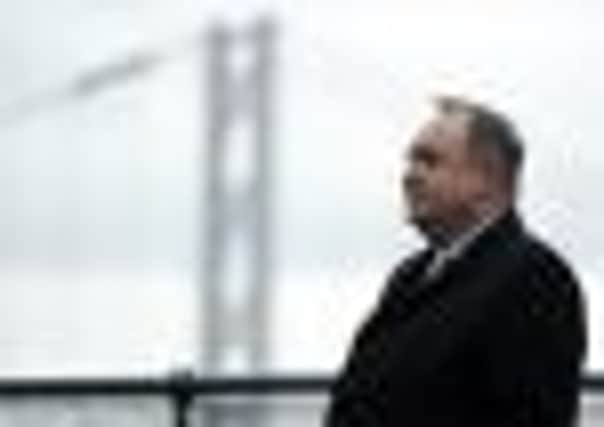Euan McColm: Salmond risks it all by failing to put the case for second question


But that’s all theatre. The truth is that Salmond is adept at avoiding real fights. When it matters, he prefers charm over attack. And when he fears charm won’t work, he prefers not to get too closely involved, thanks all the same.
Take the increasingly controversial proposal to commit an independent Scotland to Nato. There’s no battle with SNP members for Salmond there, because that’s all the doing of defence spokesman Angus Robertson. Nor is there any need for him to fall out with any influential church folk over the issue of gay marriage because that’s now squarely the business of his deputy, Nicola Sturgeon.
Advertisement
Hide AdAdvertisement
Hide AdFurther back, when the SNP feared a collision with the very “middle Scotlanders” who’d first elected them in 2007, it was Kenny MacAskill who took centre stage to repeatedly defend the decision to release the Lockerbie bomber.
Of course, it makes perfect sense for a politician trying to build a “big tent” independence movement to stay above the rough and tumble. Why on earth would he want to risk upsetting churchgoers and party activists when he’s got people to do that – and suffer the fall-out – for him?
But there’s more to it than simple political expediency. Anyone who’s followed the SNP story for the past 20 years knows that Salmond is a more cautious man than his image might suggest. He likes to sit back, accrue as many options as possible, shout at staff until they find even more options, then – at the last possible moment – select the most popular one. Or, in a worst case scenario, the least damaging one.
If he feels a major issue could hurt him, he finds among his Cabinet a willing proxy to handle it. If he feels a battle – no matter how righteous the cause – might leave a stain on his lapel, he dodges it. This approach has served Salmond well. He’s built a reputation as a great political fighter by choosing which fights he should run away from as fast as he possibly can.
But his unwillingness to get involved in the debate over how many questions there should be in the 2014 independence referendum might be a pulled punch too many.
The First Minister’s desire for a second question offering a “devo-max” option is the worst-kept secret in Holyrood. Even the most professional spin doctors struggle to keep a straight face when arguing that he’s “still got an open mind”. Cursed with what one friend describes as a “pathological fear of failure”, Salmond wants that second question on the basis that winning more powers would be a better option than losing a simple Yes/No on independence. But he won’t say so – and that could see him lose the initiative.
It’s not just members of opposition parties – at both Westminster and Holyrood – who want a single question referendum. Some serious and very senior SNP figures are strongly opposed to adding a devo-max option. Their argument is that a surefire way of losing an independence vote is to offer a “safer” middle-of-the-road option. Salmond would be wrong to underestimate the influence of those members.
Logically then, shouldn’t he stamp some authority on affairs now by declaring his view? To understand why he may be unwilling to do so, it’s worth looking back to his first spell as SNP leader. In those days, the party’s structures were an undemocratic mess, open to flagrant abuse. The rules meant that local branches could divide and multiply to boost their voting power and carve up constituencies with impunity. Salmond didn’t take on his party and reform it. He chose the safe option of ignoring the problems. In the end, those rotten systems allowed members to maliciously end the parliamentary careers of two of the First Minister’s great allies, Mike Russell and Andrew Wilson. Russell found his way back, in time, though Wilson’s presence in the chamber is still missed.
Advertisement
Hide AdAdvertisement
Hide AdThere it was, more than a decade ago – that fear of picking a fight he might not win. In the end it was his successor/predecessor, John Swinney, who tackled the SNP’s archaic structures, at no small political cost to himself. So there is a history of unwillingness when it comes to dealing with his own party on prickly issues. There’s been no “Clause Four” moment along the way for Salmond.
Some pro-second question SNP MSPs feel he has left them hanging on the subject. I’m told that when the idea of a two-question referendum was refloated, at his instruction, after this year’s council elections, there was an understanding that he’d have “got it stitched up before the end of recess”. Instead, friends of some key Cabinet figures have been advancing a more structured single-question campaign than those close to the First Minister ever expected.
This has caused some feelings of uncertainty among a parliamentary group – and membership – that expects the decision on the referendum’s form to have been agreed in time for the introduction of the necessary legislation early next year.
If Salmond wants his second question, he should stand up for it and make sure it happens. He can win the battle with the opposition over the subject. He’s got the parliamentary numbers to support two questions in the referendum bill, with backbenchers to spare (as long as he has them on side).
But it’s his seeming inability to look his own party in the eye that stands to harm him. Momentum is growing within the SNP behind support for a single question. If Salmond doesn’t pick this fight with those members, he may regret it. By his unwillingness to take the lead here, the First Minister risks his worst nightmare of valiantly leading the SNP to defeat in a single-question referendum. And he’d have nobody to blame but himself.